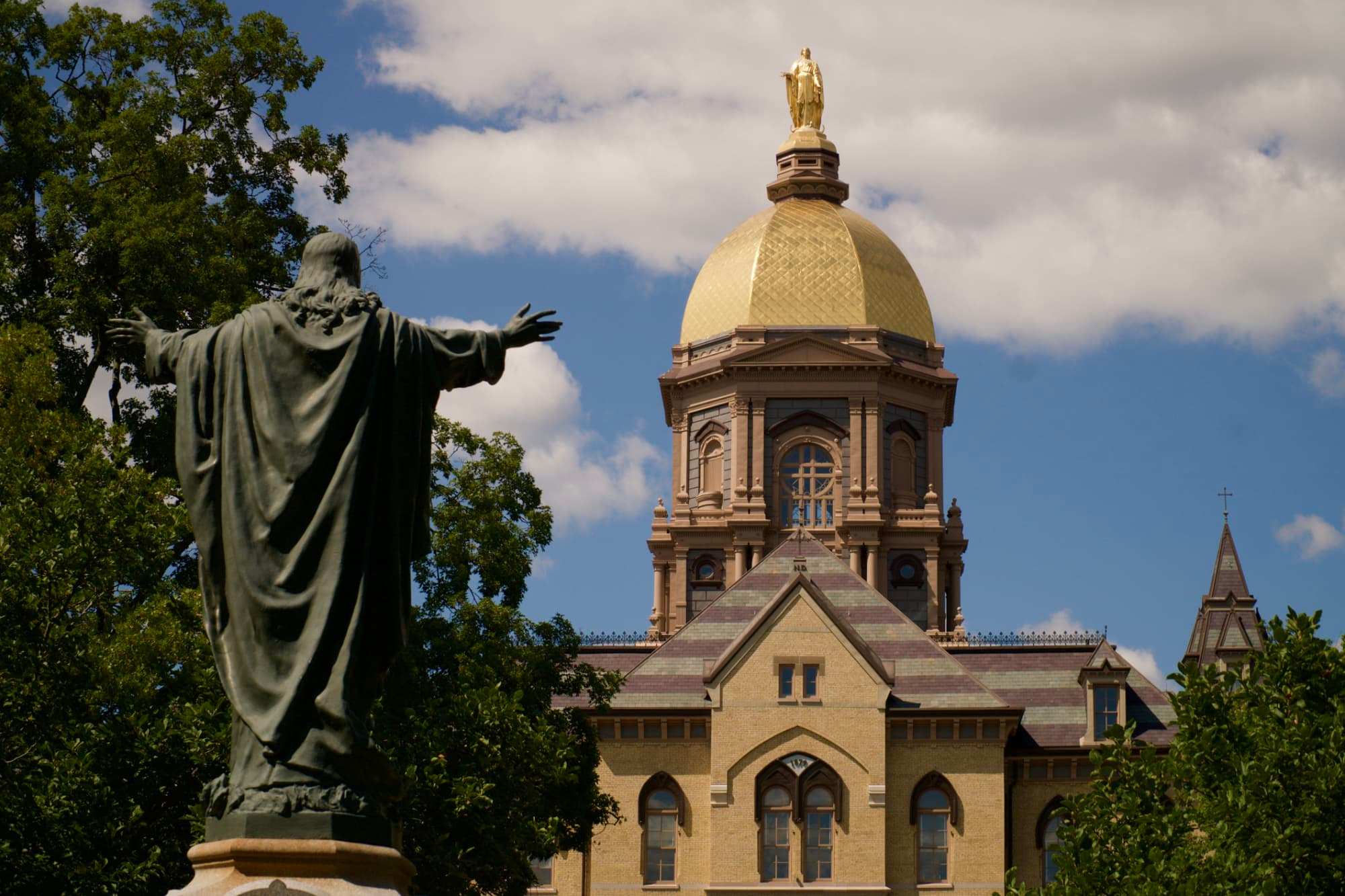Business Schools in Indiana: Full List of MBA Programs
Are you a business professional in Indiana hoping to advance in your career? Consider earning an MBA in the state. Indiana is home to several prestigious programs that blend rigorous academics with practical experience.
The top MBA schools design programs to develop your leadership skills and strategic thinking. Many require an internship and capstone project, increasing the opportunity to network with industry professionals.
An MBA is one of the most in-demand master’s degrees, followed by healthcare administration and engineering. Keep reading to find an MBA program in Indiana that can help you achieve your goals.
3 Popular Business Schools in Indiana
We’ve spotlighted three popular MBA programs in Indiana, chosen for their high enrollment, selectivity, and academic excellence.
These programs stand out because of their rigorous academics, strong industry connections, and successful alumni, making them top choices for aspiring business leaders.

Indiana University at Bloomington
The Kelley School of Business focuses on establishing a strong base for its incoming first-year students. Students can start the program with a one-week accelerated course that focuses on fundamental business concepts. All enrollees must attend a two-week career development program that aims to help students throughout the two-year program.
MBA students have the opportunity to attend unique courses including solving problems for entrepreneurs, helping coach first-year peers, and a capstone project. Working professionals can also apply to the Kelley Direct Online MBA, a virtual version of the in-person MBA program.
MBA Specializations
- Business Analytics
- Entrepreneurship and Corporate Innovation
- Finance
- Management
- Marketing
- Strategic Analysis of Accounting Information
- Supply Chain and Operations
Application Requirements
- Bachelor’s degree from an accredited college or university
- GMAT/GRE scores
- Resume
- Personal essay
- Letter of recommendation
- Proof of leadership history, community service, or campus involvement
Learn about start dates, transferring credits, availability of financial aid, and more by contacting the universities below.

University of Notre Dame
The Mendoza College of Business offers MBA programs at the University of Notre Dame. Students can focus on a concentration of their choice via various specializations with customized courses. The school boasts a 91% career placement rate within three months of graduation and a median graduate salary of $165,000.
The school strongly emphasizes career development. Career coaches are available to help attendees through one-on-one coaching sessions. Enrollees can use the skills taught by career coaches during on-campus events involving local business people.
MBA Specializations
- Dual Science Degree
- Dual Engineering Degree
- Master of Global Affairs Dual Degree
- JD/MBA
- Finance
- Consulting
- Technology | Marketing
Application Requirements
- Bachelor’s degree from an accredited college or university
- Two letters of recommendations
- A slide presentation
- Statement of purpose and essay
- Video assessment

Purdue University
Purdue University’s Mitchell E. Daniels, Jr. School of Business MBA program is known for its rigorous curriculum and strong focus on analytical skills and technology-driven management. The variety of MBA specializations reflects this focus.
The MBA program blends classroom learning and real-world experience with an opportunity for global projects. The program emphasizes leadership, teamwork, and innovation to prepare a strong foundation for a successful career.
The school’s close ties with Purdue’s renowned engineering and technology programs enhance its distinctive approach to business education.
MBA Specializations
- Digital Marketing and Analytics
- Finance
- Information Management
- Accounting
- Global Supply Chain Management
- Human Resource Management
- Marketing
- Innovation and Technology Commercialization
- Leadership Negotiation and Change Management
- Machine Learning and AI
- Strategic Change and Transformation
Application Requirements
- Minimum GPA of 3.0
- At least 24 months of work experience
- Bachelor’s degree from an accredited college or university
- Academic statement of purpose
- Two letters of recommendation
- Resume
- Official transcripts
- Interview
Full List of MBA Programs in Indiana
This list of Indiana MBA programs exclusively spotlight nonprofit schools with MBA programs accredited by the organizations listed below.
Accredited programs maintain high academic standards and provide a quality education. Accreditation signifies that the program meets rigorous criteria and commits to providing a comprehensive educational experience that prepares students for successful careers in business.
- Association to Advance Collegiate Schools of Business (AACSB)
- Accreditation Council for Business Schools and Programs (ACBSP)
- International Accreditation Council for Business Education (IACBE)
All Business Schools in Indiana
| School⇅ | City⇅ | Type⇅ | Accreditation⇅ |
|---|---|---|---|
| Anderson University | Anderson | Private | ACBSP |
| Indiana Wesleyan University | Marion | Private | ACBSP |
| Purdue University Global | West Lafayette | Public | ACBSP |
| University of Indianapolis | Indianapolis | Private | ACBSP |
| University of Saint Francis | Fort Wayne | Private | ACBSP |
| Indiana Institute of Technology | Fort Wayne | Private | IACBE |
| Marian University | Indianapolis | Private | IACBE |
| Oakland City University | Oakland City | Private | IACBE |
| Indiana University East | Richmond | Public | AACSB |
| Indiana University Kokomo | Kokomo | Public | AACSB |
Why Earn Your MBA in Indiana?
Indiana offers many opportunities for MBA students. Known as the “Crossroads of America,” the state is a nationwide leader in healthcare, technology, manufacturing, and logistics. To meet the needs of these industries, many MBA programs in the state equip students with relevant, high-demand skills.
Indiana’s commitment to higher education is reflected in its substantial enrollment. According to the National Center for Education Statistics (NCES), in 2022, nearly 350,000 students were enrolled at public, degree-granting postsecondary institutions. Efforts to improve these numbers, such as Indiana’s “You Can. Go Back.” campaign, encourage adult learners to complete their degrees.
Scholarship offerings are plentiful, ranging from state-funded opportunities like the Frank O’Bannon Grant to institutional scholarships provided by individual colleges.
The ties formed during an MBA program often lead to fruitful professional relationships and job opportunities, particularly in a state as economically diverse as Indiana.
MBA Cost in Indiana
Indiana MBA tuition varies widely, ranging from approximately $12,600-$45,700 per year, depending on whether the institution is public or private.
You can help alleviate this financial burden by taking advantage of federal and private financial aid options, such as student loans, work-study programs, and assistantships. Many schools also offer scholarships and grants specific to the MBA program, and Indiana residents can benefit from state-specific grants.
Prospective students should explore their options with the institution’s financial aid office for information on available funding opportunities.
MBA Jobs in Indiana
In Indiana, there is a vibrant and dynamic economy, with manufacturing, healthcare, and professional services standing out as key industries. These sectors, among others, often seek professionals equipped with MBA degrees to take on strategic roles and drive organizational success.
The state’s job outlook is promising. It shows steady growth across most industries, specifically in roles that benefit from an MBA education.
Major cities like Indianapolis, Fort Wayne, and Evansville are hubs for businesses and offer lucrative opportunities for MBA graduates.
| Job | Indiana Average Annual Salary (May 2023) | Indiana Growth Rate (2022-2032) |
|---|---|---|
| Chief Executives | $281,730 | -6.6% |
| Financial Managers | $135,840 | 16.6% |
| Sales Managers | $134,820 | 3.9% |
| Marketing Managers | $131,620 | 8% |
| Human Resources Managers | $130,540 | 5.2% |
| General and Operations Managers | $129,530 | 5% |
| Fundraising Managers | $123,820 | 6.2% |
| Training and Development Managers | $120,730 | 7.5% |
| Purchasing Managers | $120,390 | 5.7% |
| Public Relations Managers | $115,620 | 6.1% |
Frequently Asked Questions About Business Schools in Indiana
Typically, Indiana University Kelley School of Business has the most difficult admission criteria to meet.
The program consistently ranks among the top business schools in the nation. They require high GMAT or GRE scores, a strong academic record, professional experience, and personal essays and recommendations. The competitive admission process maintains high-caliber students and enhances the program’s reputation.
Note: The insights on this page were reviewed by an independent third party compensated for their time by BestColleges. Page last reviewed July 9, 2024.
Explore More College Resources

Best Colleges in Indiana
Read our ranking of the best colleges in Indiana to learn about the programs that provide the best professional outcomes.

by Hannah Muniz
Updated October 31, 2024

Best Online MBA Programs
These top online MBA programs can help you save money, work while you study, and start a lucrative business career.

by Meg Embry
Updated December 9, 2024

